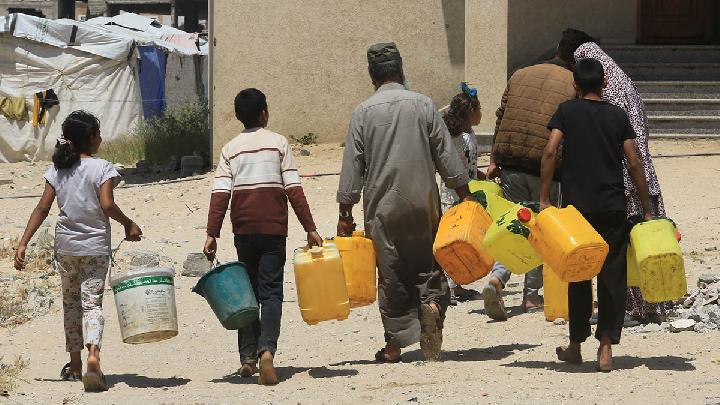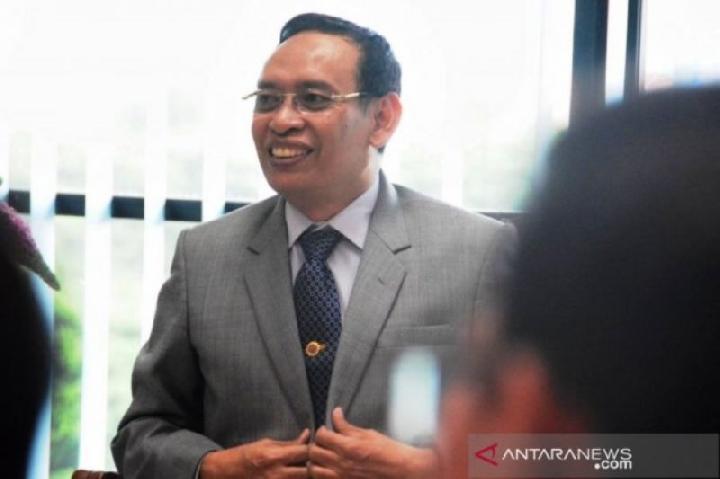TEMPO.CO, Jakarta - The Indonesian government refutes concerns that Law Number 27 of 2022 concerning Personal Data Protection (PDP Law) could restricts civil society spaces, especially journalists, academics, and artists, to unveil personal data.
The statement was made by Alexander Sabar, the Director General of Digital Space Supervision at the Ministry of Communication and Digital (Komdigi), during the hearing of Case Number 135/PUU-XXIII/2025 and 137/PUU-XXIII/2025 regarding PDP Law at the Constitutional Court, Jakarta on Tuesday, 23rd September 2025.
Alexander argued that the provisions in Article 65 paragraph (2) and Article 67 paragraph (2) of PDP Law were not intended to limit the space for the public, journalists, academics, and artists in carrying out their roles, functions, or duties. He mentioned that the article was meant to ensure that any disclosure of personal data is done lawfullly.
According to him, personal data disclosure must adhere to personal data protection principles outlined in the PDP Law.
"The proposal raises legal uncertainties, putting journalistic, academic, artistic, and literary work in a special position without supervision mechanisms, and potentially opening up space for the disclosure of highly sensitive personal data such as health, biometric, genetic, and financial data," said Alexander as quoted from the MKRI YouTube channel.
Broad Interpretation of PDP Law
Case Number 135/PUU-XXIII/2025 was filed by academics Masduki, Illustrator and Caricaturist Amry Al Mursalaat, the Alliance of Independent Journalists (AJI) Indonesia, and the Southeast Asia Freedom of Expression Network (SAFEnet). They are part of the Civil Society Coalition for Freedom of Information and Personal Data (SIKAP).
The coalition argues that Article 65 paragraph (2) in conjunction with Article 67 paragraph (2) of the PDP Law opens up a broad and lax interpretation, which could threaten the constitutional rights of the petitioners, as their job responsibilities often involve the disclosure of personal data for the fulfillment of the right to public information.
Article 65 paragraph (2) PDP Law states, "Anyone is prohibited from unlawfully disclosing personal data that do not belong to them."
Meanwhile, Article 67 paragraph (2) PDP Law states, "Anyone who intentionally and unlawfully discloses personal data that do not belong to them as referred to in Article 65 paragraph (2) shall be punished with a maximum imprisonment of 4 (four) years and/or a maximum fine of Rp 4 billion."
However, Alexander stated that the criminal provisions in Article 67 paragraph (2) of PDP Law serve as an instrument to enforce accountability, not to limit freedom of expression or the right to public information. According to him, the right to public information is guaranteed under Article 28F of the 1945 Indonesian Constitution.
He explained that this right is also specifically regulated in Law Number 14 of 2008 concerning Public Information Openness, which remains valid and complements the PDP Law. "There is no conflict between personal data protection and the public's right to information," said Alexander.
According to Alexander, despite the PDP Law not providing exceptions, does not mean journalistic works are not protected.
If journalists disclose personal data in their work, he said, the legality or validity of such actions must be analyzed within the frame of Article 16 paragraph (2) of PDP Law and the basis of personal data processing as regulated in Article 20 of PDP Law.
According to Alexander, the provisions in Article 16 paragraph (2) and Article 20 of PDP Law align with the Press Law, which regulates the right to refuse, the right to reply, the right to correction, the obligation of correction, and legal protection for journalists in carrying out their profession.
"The concern about criminalization becomes irrelevant because there is already a clear legal framework and hierarchy that protects journalists," he said.
Alexander worried that granting the applicants' petition would render the challenged articles unconstitutional and harmful for democracy. Without any unlawful elements, all forms of disclosure would be prohibited, except for the two conditions proposed by the Applicants.
"However, there are regulations that provide the right or authority to disclose personal data," he said.
Transfer of Personal Data to the US
Meanwhile, Case Number 137/PUU-XXIII/2025 was filed by a law lecturer and advocate Rega Felix. He challenged Article 56 paragraph (1), (2), (3), and (4) of PDP Law. According to Rega, the article does not place the sovereignty of the people as the true owner of personal data, as if the issue of the transfer of personal data is only considered a technical matter that does not have a far-reaching impact on people's lives.
Rega's petition was registered after the agreement between the Indonesian Government and the United States regarding the transfer of personal data of citizens as part of a mutual trade agreement. Rega viewed the agreement on the transfer of personal data from Indonesia to the US without the people's consent mechanisms as significantly impacting the constitutional rights of the petitioners as mandated by Article 28G paragraph (1) of the 1945 Constitution.
Member of the Indonesian House of Representatives Commission III, Abdullah, who attended the hearing virtually, said that Commission I had called on the government to ensure that the exchange of personal data of Indonesian citizens to the United States must be carried out in accordance with the provisions of the PDP Law and the constitutional rights guaranteed by Article 28G paragraph (1) of the 1945 Constitution.
"In the exchange of personal data, the government must ensure the adequate protection of personal data to the countries that cooperate in the exchange of such data," said Abdullah.
Editor’s Choice: Indonesian Govt Considers Facial Scanning to Verify Social Media Users
Click here to get the latest news updates from Tempo on Google News






























:strip_icc():format(jpeg)/kly-media-production/medias/4802751/original/096926300_1713245922-20240416-Hari_Pertama_ASN_Setelah_Cuti_Lebaran-HER_1.jpg)
:strip_icc():format(jpeg)/kly-media-production/medias/2240997/original/070157500_1528277766-arches-architecture-building-460680.jpg)

:strip_icc():format(jpeg)/kly-media-production/medias/3246732/original/031301300_1600849571-Ilustrasi-Gedung-MA-1.jpg)

:strip_icc():format(jpeg)/kly-media-production/medias/3515783/original/075335200_1626773671-20210720-Data-Sembuh-COVID-19-Meningkat-5.jpg)


:strip_icc():format(jpeg)/kly-media-production/medias/3502310/original/bic-faithful-dark-skinned-woman-keeps-hands-praying-gesture-asks-allah-good-health-believes-wellness-has-veiled-head-wears-white-shirt-keeps-eyes-closed-enjoys-peaceful-atmosphere_273609-26346__8_.jpg)



:strip_icc():format(jpeg)/kly-media-production/medias/3429184/original/081227700_1618457377-masjid-pogung-dalangan-VqrGmPlsx8s-unsplash.jpg)


:strip_icc():format(jpeg)/kly-media-production/medias/2239489/original/058213500_1528198042-clouds-mosque-muslim-87500.jpg)


:strip_icc():format(jpeg)/kly-media-production/medias/3191036/original/025792900_1595821870-muslim-woman-pray-hijab_73740-674.jpg)
